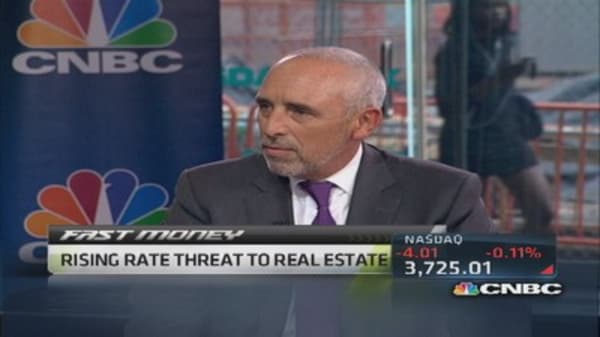(Read more: Tech 'winners will continue to run')
"I think it's almost impossible to avoid some slowdown if rates rise, but it's not a perfect correlation," Flexner said. "If they go up another 50 basis points, the damage both on the residential side and commercial side is probably limited. If we approach a 4 or 4½ percent 10-year down the road, then it's going to have consequential impact, I think, on housing demand, as well as commercial real estate values."
Flexner also explained how differently rising rates could affect commercial real estate.
(Read more: How the market gets to new highs: Dan Nathan)
"I think the commercial side is arithmetic. The cost of capital in real estate is the cost of good soul because it's so capital intensive. And the cost of debt is a primary component," he said.
"Investors have required returns and expected returns, and when you start raising the cost of debt in commercial, it has a two-fold effect. One is it's costing you more in debt service. But the other is, you can borrow less because a given income stream can always support a certain amount of debt service. So, your proceeds go down and the costs go up, and ultimately that does factor into gross asset values."
— By CNBC's Bruno J. Navarro. Follow him on Twitter @Bruno_J_Navarro.
— CNBC's Stephanie Landsman contributed research to this report. Follow her on Twitter: @StephLandsman.
Trader disclosure: On Sept. 11, 2013, the following stocks and commodities mentioned or intended to be mentioned on CNBC's "Fast Money" were owned by the "Fast Money" traders: Steve Grasso is long BA; Steve Grasso is long BAC; Steve Grasso is long BBRY; Steve Grasso is long GDX; Steve Grasso is long GOOG; Steve Grasso is long HPQ; Steve Grasso is long MHY; Steve Grasso is long LNG; Steve Grasso is long MJNA; Steve Grasso is long NVIV; Steve Grasso is long PFE; Steve Grasso is long QCOM; Steve Grasso is long S; Steve Grasso is long ASTM; Steve Grasso is long POT; Steve Grasso is long DECK; Steve Grasso is long EEM; Steve Grasso is long DHI; Karen Finerman is long AAPL; Karen Finerman is long BAC; Karen Finerman is long C; Karen Finerman is long JPM; Karen Finerman is long TGT; Karen Finerman is long GOOG; Karen Finerman is long M; Karen Finerman is long GM; Karen Finerman is long MDY PUTS; Dan Nathan is long GE; Dan Nathan is long IBM; Dan Nathan is long TSLA; Dan Nathan is long VIX; Dan Nathan is long CAT; Dan Nathan is long MSFT; Dan Nathan is long FXI; Dan Nathan is long WFM; Dan Nathan is long ZNGA; Dan Nathan is long XCO.




